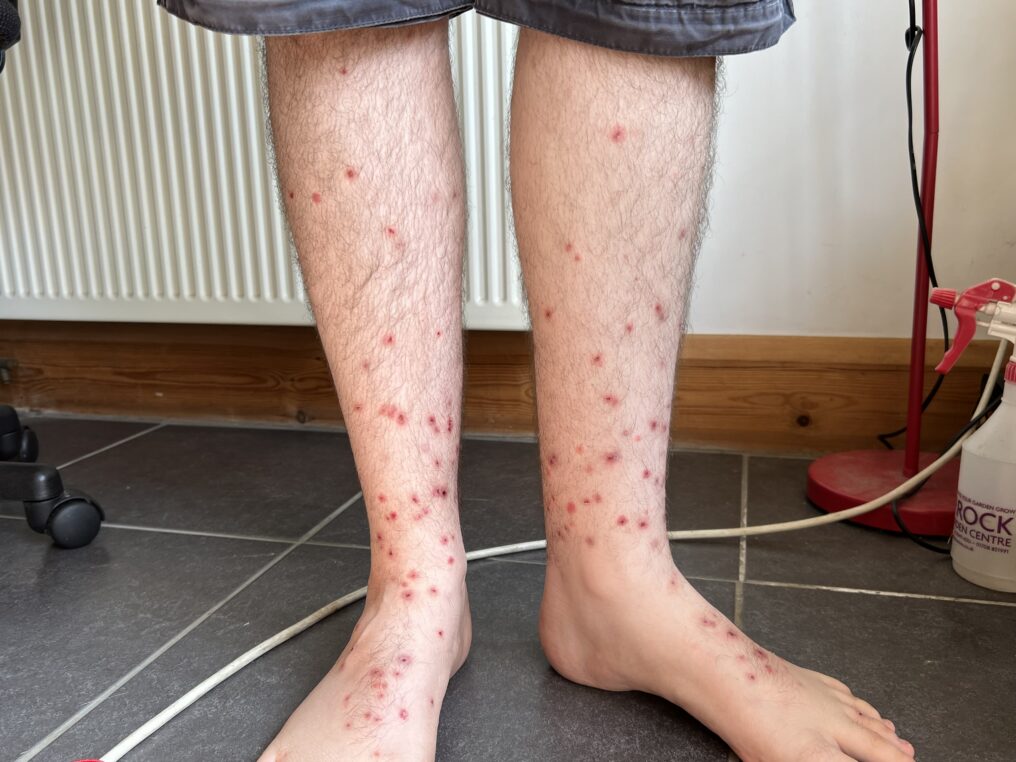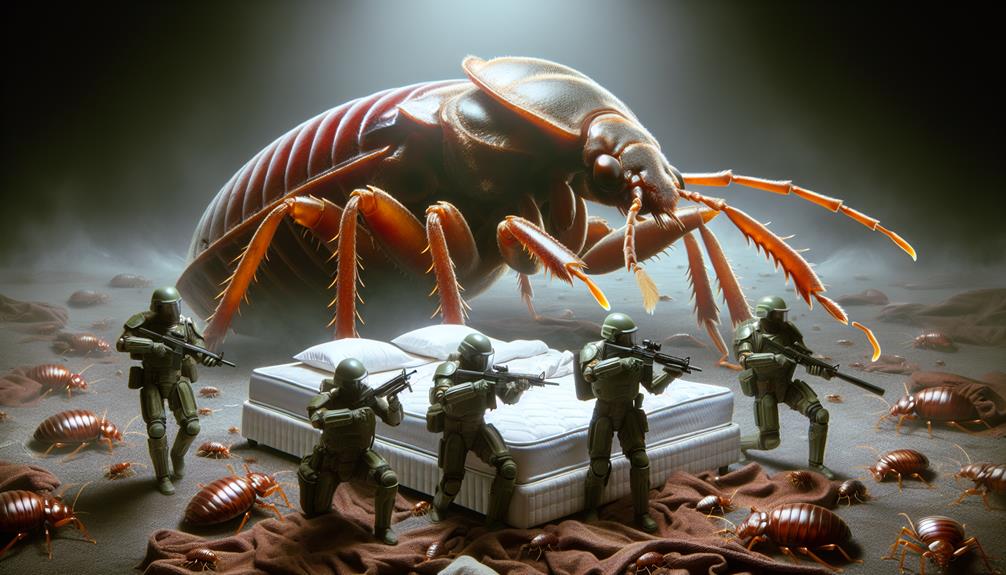Bed bug infestations are a growing problem in urban areas, affecting homes and businesses alike. Recent statistics show a significant increase in reported cases of bed bug bites, with a staggering 97% rise in the past decade alone. It is crucial to be able to identify these bites in order to effectively control and prevent infestations. This article aims to provide a comprehensive understanding of bed bug bites, including their characteristics, reactions, and available treatment options.
By examining the appearance, timing, and severity of the bites, as well as exploring different treatment methods, individuals can better manage and alleviate the discomfort caused by these bites. Additionally, we will discuss ways to identify bed bugs in your home and dispel common misconceptions about the transmission of diseases through bed bug bites. It is our goal to provide accurate and scientific information that empowers readers to effectively identify and address bed bug infestations.
Key Takeaways
- Bed bug bites can resemble bites from other insects and typically appear as swollen red spots that often itch.
- Reactions to bed bug bites can vary and some people may not have any immediate reaction.
- Treatment for bed bug bites typically involves cleaning the area with soap and water and using corticosteroid cream to relieve itchiness.
- Identifying bed bugs in your home can be done by looking for evidence such as small blood spots on sheets or mattresses, shed exoskeletons on mattress edges, and a musty smell.
What Bed Bug Bites Look Like

Bed bug bites can be identified by the presence of swollen red spots that often itch and resemble other insect bites. These bites typically occur on any exposed part of the body. It is important to note that not everyone will have a reaction to bed bug bites.
The bites are caused by bed bugs, which prefer to feed on human blood. They result in itchy bumps that can vary in appearance from person to person. In some cases, individuals may develop a rash that resembles eczema. To prevent bed bug bites, it is important to take precautionary measures such as regularly checking for evidence of bed bugs in the home, such as small blood spots on sheets or mattresses, shed exoskeletons along mattress edges, and a musty smell. Additionally, using a flashlight to inspect for bed bugs at night can help in identifying their presence.
Timing and Reactions
The timing of reactions to bed bug bites can vary, with some individuals not experiencing a reaction immediately and others showing symptoms within a range of time from immediately to two weeks. Sensitivity to bites can also vary from person to person, with some individuals becoming more sensitive over time. The severity of the bed bug infestation can also impact the physical reaction to the bites.
It is important to note that while bed bug bites can cause physical discomfort, they do not transmit diseases to humans. However, the impact on mental health should not be overlooked. Having bed bugs can be stressful and embarrassing, which can have a significant effect on individuals. It is crucial to address both the physical and emotional aspects when dealing with bed bug infestations.
Treatment Options
One option for addressing the discomfort caused by bed bug bites is to clean the affected area with soap and water. This helps to remove any dirt or bacteria that may have been introduced into the skin through scratching. In addition to this, there are alternative treatment methods and natural remedies that can be used to alleviate the symptoms of bed bug bites.
These include applying a cold compress to reduce swelling and itching, using over-the-counter hydrocortisone creams or calamine lotion to soothe the skin, and taking antihistamines to reduce allergic reactions. Natural remedies such as aloe vera gel, tea tree oil, and witch hazel may also provide relief. However, it is important to note that while these methods may help to alleviate symptoms, they do not eliminate the underlying bed bug infestation. Therefore, it is crucial to also seek professional pest control services to effectively eradicate bed bugs from the home.
Identifying In Your Home
Amidst the musty odour that can be indicative of their presence, the discovery of small blood spots on sheets or mattresses may serve as a subtle yet concerning clue of a potential bed bug infestation in your home. These tiny blood stains are a result of bed bugs feeding on human blood and accidentally crushing them while moving.
Additionally, it is important to examine the edges of the mattress for shed exoskeletons, which bed bugs discard as they grow. Another telltale sign of bed bugs is the presence of a sweet, musty smell in the affected area. To prevent bed bug infestations, it is crucial to regularly inspect bedding, furniture, and carpeting. Taking immediate action upon recognizing signs of a bed bug infestation can help prevent the spread and further discomfort caused by these pests.
Bed bugs and Disease
Bed bug infestations have been found to have minimal impact on human health, with bites not transmitting diseases like mosquitoes. However, the presence of bed bugs can have a significant impact on the mental health of individuals. The stress and embarrassment associated with having bed bugs in one’s home can be overwhelming. It is important to note that bed bug bites are often mistaken for other insect bites, such as mosquito bites.
The bites typically result in swollen red spots that can be itchy and may resemble mosquito bites. Comparatively, mosquitoes pose a greater risk of transmitting diseases to humans. Understanding the minimal health risks of bed bug bites can help individuals focus on addressing the infestation and seeking appropriate treatment, while also alleviating unnecessary concerns about disease transmission.
| Impact of Bed bug Infestations on Mental Health | |
|---|---|
| Positive | Feelings of belonging, support, and understanding |
| Negative | Stress, embarrassment, and anxiety |
| Neutral | Concern, vigilance, and precautionary measures |
| Ambiguous | Uncertainty and confusion about the infestation |
Frequently Asked Questions
Can bed bug bites cause allergic reactions?
Bed bug bites can cause allergic reactions in some individuals. Treatment for bed bug bite reactions typically involves cleaning the area with soap and water, using corticosteroid cream to relieve itching, and seeking medical attention for severe or allergic reactions.
How long do bed bug bites typically last?
Bed bug bites typically last for about one to two weeks. The duration can vary depending on individual reactions and the severity of the infestation. Remedies for bed bug bites include cleaning the area, using corticosteroid cream, and seeking medical attention for allergic reactions or infections.
Are bed bug bites contagious?
Bed bug bites are typically itchy, but they do not leave scars. The bites can result in swollen red spots that resemble mosquito bites. They are not contagious and do not transmit diseases to humans.
Can bed bugs live in clothing or other fabrics?
Bed bugs can live in clothing and other fabrics, making it easier for them to spread and cause a bed bug infestation. Signs and symptoms of bed bug bites include swollen red spots that often itch.
How can I prevent bed bug infestations in my home?
To prevent bed bug infestations in your home, implement effective strategies such as regular cleaning, vacuuming, and decluttering. Seal cracks and crevices, use mattress encasements, and wash bedding regularly. Consider professional pest control if the infestation persists.
You may also enjoy reading this article
Was This Article Helpful?
- Please provide feedback and comments to help us improve our content.
- Share your experiences and any additional tips you have for dealing with pests.
Share this Post



